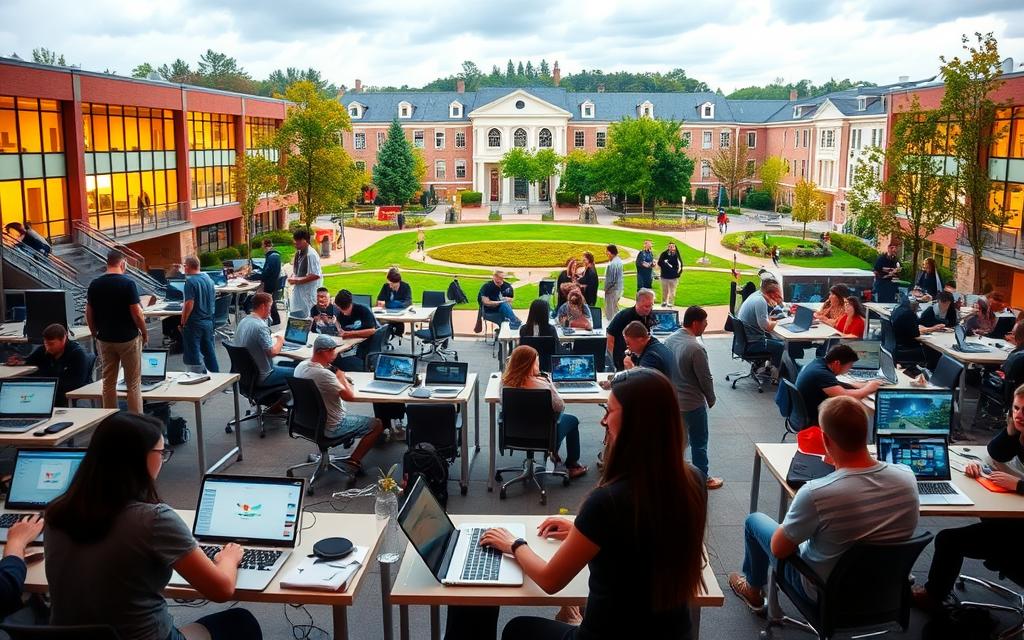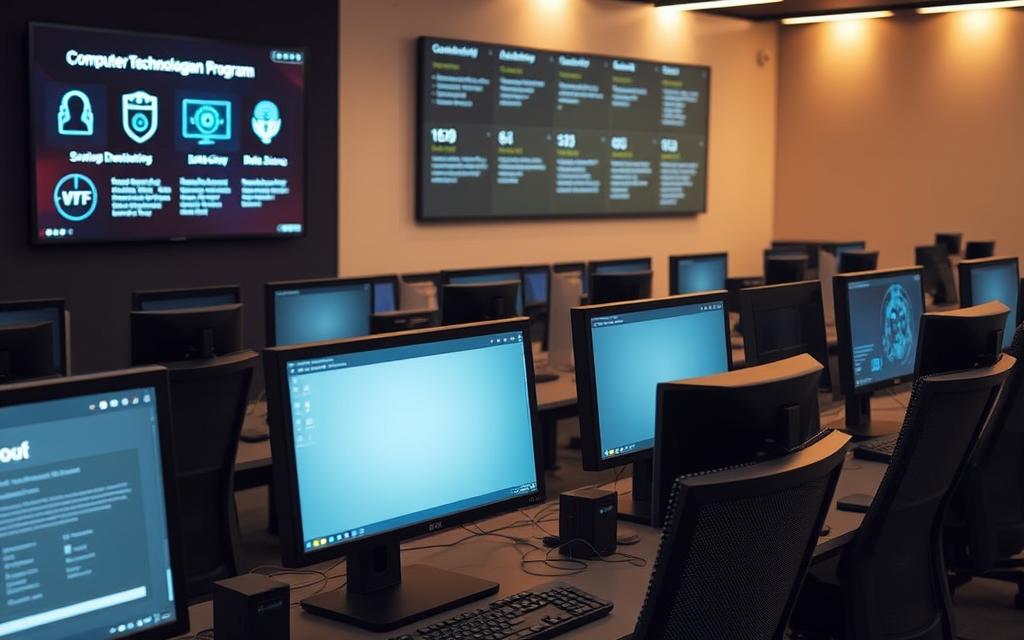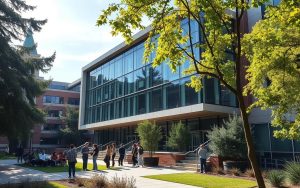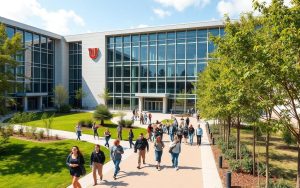Table of Contents
Many students explore higher education options in technology fields. Piedmont College offers a range of academic programs, but does it include a computer science degree? Let’s clarify this upfront.
It’s important to distinguish between Piedmont College and Piedmont Technical College. While both institutions provide quality education, their program offerings differ. Those seeking tech-focused degrees should review each school’s curriculum carefully.
The tech industry continues growing rapidly, with a 12% national growth in IT fields reported by the BLS. Piedmont institutions prepare learners for these opportunities through alternative technology programs. Recent graduates in related fields achieve a 75% placement rate, demonstrating strong career prospects.
For aspiring tech professionals, understanding available degree paths is crucial. Whether pursuing traditional or specialized programs, students can find pathways to success in this dynamic field.
Does Piedmont College Have a Computer Science Program?
Institutions provide diverse pathways for those pursuing IT careers. While Piedmont College focuses on liberal arts, Piedmont Technical College specializes in hands-on technology training. Understanding this distinction helps students align their goals with the right programs.
Computer Technology Program Offerings
Piedmont Technical College’s Computer Technology program stands out with three A.A.S. concentrations:
- Cybersecurity: Prepares learners for threat analysis and data protection.
- Networking: Covers hardware setup and system maintenance.
- Programming: Focuses on software development and coding languages.
Each track includes industry-recognized certifications like CompTIA and Microsoft.
Flexible Learning Options
Students benefit from full-time or part-time schedules, with select courses available online. Course credits remain valid for eight years, allowing for paced progression.
“Technical certifications enhance employability in competitive IT markets,”
notes a program advisor.
Certificate programs, such as PC Technician and Certified IT Professional, offer accelerated paths to entry-level roles. These options cater to both career changers and advancing professionals.
Alternative Pathways for Computer Science Students
Tech-focused learners often seek flexible education paths. Many institutions provide structured routes to bridge associate and bachelor’s programs. These options ensure students gain foundational skills before advancing.

Seamless Transition to Four-Year Universities
The Associate of Science in Computer Science (Code: 246) is designed for university transfer. Its core curriculum includes calculus, physics, and programming fundamentals. Electives in humanities align with four-year institution requirements.
Key features of 2+2 transfer pathways:
- Guaranteed credit acceptance at partner universities.
- Writing Intensive Course (WIC) for graduation compliance.
- Exposure to languages like C++, Java, and Visual Basic.
Associate Degrees with Career-Ready Skills
Two-year programs emphasize hands-on training. Graduates qualify for roles like IT support or junior developers. Below, median salaries highlight the value of advanced training:
| Role | Median Salary |
|---|---|
| Programmer | $75,680 |
| Support Specialist | $49,080 |
Early career professionals often use associate degrees as stepping stones. Coordinating with target universities ensures a smooth transition to a science degree.
Career Opportunities with a Computer Science Degree
Technology careers continue expanding, offering diverse roles for skilled professionals. The Bureau of Labor Statistics projects a 12% growth in IT fields through 2024, outpacing many industries. Graduates enter a market where 75% secure jobs within six months, often with top employers like Dell and Verizon.
Growing Demand in Tech Fields
South Carolina’s tech salaries align closely with national averages. Entry-level roles in security systems or IT support are in high demand. Government and healthcare sectors particularly seek experts in data protection.
Key employers hiring locally include:
- SC Law Enforcement Division
- 85+ regional businesses
- National corporations like Verizon
Median Salaries and Job Placements
Salaries reflect specialized training levels. Below, compare earnings for common roles:
| Position | South Carolina | National |
|---|---|---|
| IT Support Specialist | $49,080 | $52,690 |
| Software Developer | $75,680 | $82,430 |
Physical demands vary. Most roles require desk-based work, but field technicians may need to install hardware. Certifications in network systems or cybersecurity boost earning potential.
“Our graduates thrive in high-stakes environments, from corporate IT to public safety,”
notes a career advisor. Advanced training opens doors in software development and infrastructure management.
Computer Technology Program Concentrations
The digital age demands expertise in cybersecurity, networking, and software development. Specialized tracks equip learners with industry-relevant skills, blending theory with hands-on practice.

Cybersecurity: Skills and Curriculum
This concentration covers threat analysis, forensic investigation, and ethical hacking. Students master infrastructure protection and compliance frameworks.
Key coursework includes:
- Data encryption and intrusion detection systems.
- Certification prep for CompTIA Security+.
“Ethical training ensures graduates can defend against evolving threats,”
states a program instructor.
Networking: Hardware and Software Focus
Labs feature real Cisco equipment, teaching WAN design and Microsoft/UNIX administration. Courses emphasize troubleshooting and cloud systems.
Students gain experience in:
- Configuring routers and switches.
- Earning CCNA credentials.
Programming: Languages and Development
The track explores Java, C++, and database platforms. Learners build projects using Visual Studio, following the full software lifecycle.
Highlights:
- Debugging and version control concepts.
- Capstone projects for portfolio development.
Admission Requirements and Program Structure
Aspiring tech professionals need clear program details before enrolling. The requirements are designed to ensure success while remaining accessible. No prior experience is needed, making it ideal for career changers.

Entry-Level Prerequisites
Basic computer literacy is expected, including file management and web navigation. The program starts any term, with day or evening courses available. Students can transfer credits from accredited institutions, speeding up completion.
General education courses include:
- English composition
- College algebra
- Social sciences electives
Full-Time vs. Part-Time Study Options
Choose a pace that fits your schedule. Below, compare completion timelines:
| Study Plan | Completion Time | Weekly Hours |
|---|---|---|
| Full-time | 2 years | 15–20 |
| Part-time | 3–4 years | 6–10 |
Hybrid options blend campus and online learning. Over 60% of classes are virtual, with faculty and staff available for in-person or virtual advising.
“Our advisors help tailor schedules to balance work and study,”
says a program coordinator. Early planning ensures on-time graduation and career readiness.
Why Choose a Computer Science-Related Field?
The tech industry’s rapid evolution creates unmatched career potential for skilled professionals. With 93% of graduates feeling job-ready, programs blend theory with real-world practice. Faculty staff guide learners through cutting-edge curricula tailored to market needs.

Industry Growth and Stability
Cloud computing and cybersecurity drive a 12% job growth nationwide. Programs continuously update courses to reflect these trends. Local business partnerships provide live projects, ensuring graduates solve actual industry challenges.
Key advantages:
- Stackable credentials: Earn CompTIA, Microsoft, or Cisco certifications.
- Hybrid learning: Balance online theory with lab-based skills development.
- Internships: Work with regional employers like Dell or Verizon.
Hands-On Learning and Certifications
Students complete 3–5 industry certifications before graduation. Labs simulate real-world scenarios, from network breaches to software development. Faculty staff mentor learners through capstone projects for portfolios.
“Certifications validate expertise in competitive markets,”
notes a program director. Hybrid formats let students master computing concepts while applying them in client projects. This approach bridges classroom learning and business needs seamlessly.
Conclusion
Tech careers thrive on specialized training and industry-recognized credentials. Piedmont Technical College stands out with hands-on programs in cybersecurity, networking, and software development. Graduates gain multiple certifications, boosting their job prospects in high-demand fields.
Flexible study options, including hybrid formats, help learners balance education with work. With strong placement rates and transfer pathways, students can launch careers or continue toward a four-year degree.
For those seeking long-term growth in tech, these programs open doors to stable, well-paying opportunities. Explore course details today to take the first step toward a rewarding future.
FAQ
What computer-related programs does Piedmont College offer?
Piedmont College provides programs in computer technology, including cybersecurity, networking, and programming. These focus on hands-on skills for careers in IT.
Can I transfer credits from a computer science program to a four-year university?
Yes, many courses align with transfer agreements, allowing students to continue their education at partner institutions.
What career opportunities are available with a computer technology degree?
Graduates can pursue roles in cybersecurity, network administration, or software development, with strong demand and competitive salaries.
What is the difference between cybersecurity and networking concentrations?
Cybersecurity focuses on protecting systems, while networking covers hardware and software infrastructure setup and maintenance.
Are there part-time study options for working students?
Yes, flexible schedules allow students to balance coursework with jobs, including evening and online classes.
What certifications can I earn alongside my degree?
Programs may include prep for industry-recognized certifications like CompTIA Security+ or Cisco CCNA.
What are the admission requirements for computer technology programs?
Requirements typically include a high school diploma or GED, with some programs requiring basic math proficiency.
How does hands-on learning enhance the curriculum?
Labs and real-world projects help students apply programming, security, and networking concepts before entering the workforce.









